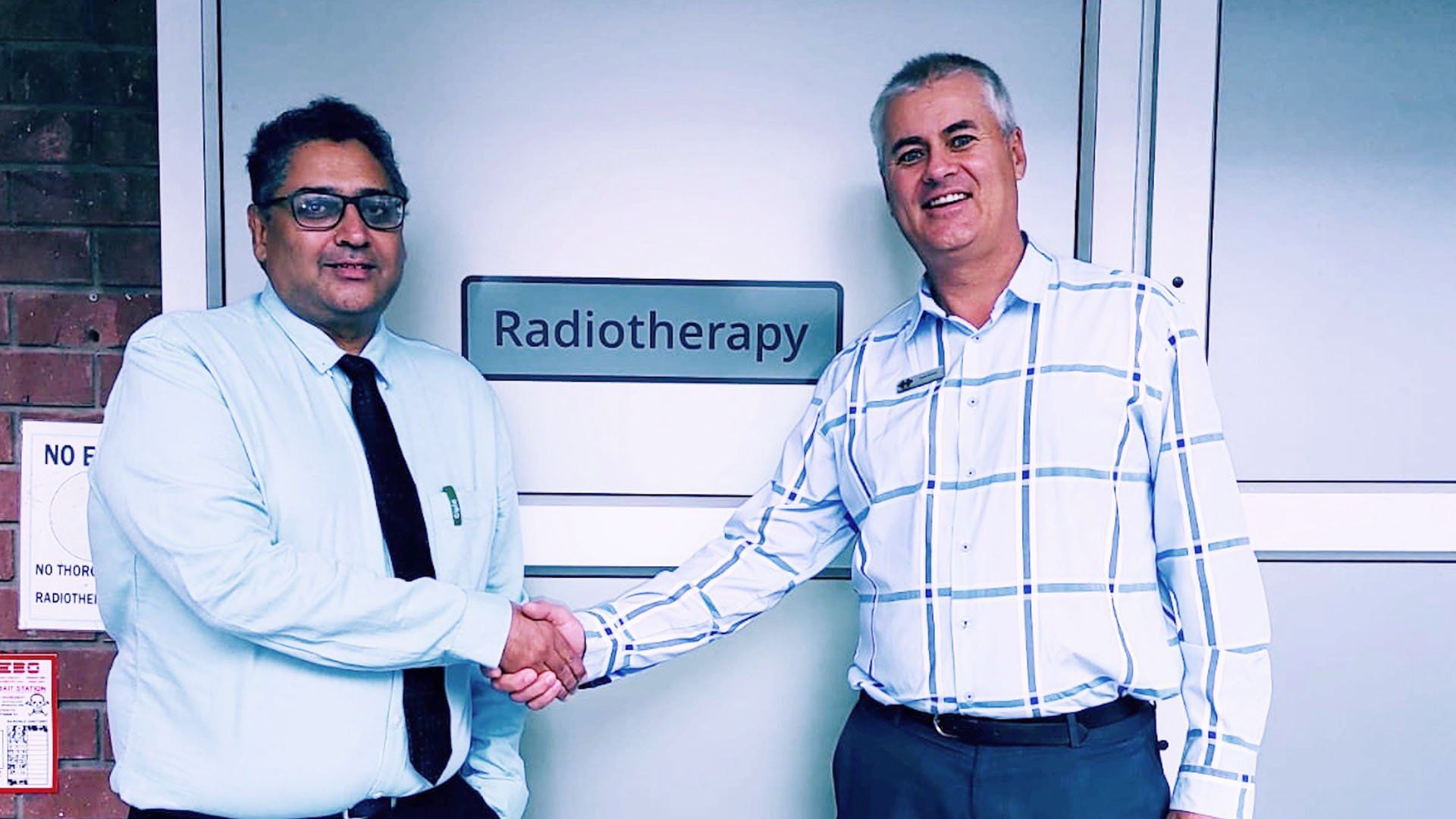Confronting cancer with comprehensive service
One of the radiation oncologists practising at Netcare St Anne’s Hospital, Dr Jeethendra Sithlu of Hopelands Cancer Centre, is pictured with general manager of the hospital, Louis Joubert, at the radiotherapy unit. The hospital now offers in-house radiotherapy in addition to other cancer care services.
In-house radiation therapy now available at Netcare St Anne’s Hospital
The recent installation of a state-of-the-art linear accelerator at Netcare St Anne’s Hospital is bringing the benefits of a comprehensive cancer care service underpinned by multi-disciplinary expertise to the communities of Pietermaritzburg and surrounding areas.
“With the introduction of the advanced Varian linear accelerator here at the hospital, offering a range of specialised radiation therapies to cancer patients, we are now able to provide comprehensive and integrated in-house cancer care for the convenience and comfort of patients diagnosed with cancer,” says Louis Joubert, general manager of Netcare St Anne’s Hospital.
Specialist collaboration in cancer care
Multi-disciplinary collaboration by medical professionals has been a feature of cancer care at Netcare St Anne’s Hospital, enabling them to provide integrated and holistic care centred around the individual person’s unique circumstances and needs.
For many years, Hopelands Cancer Centre has offered chemotherapy treatment at Netcare St Anne’s Hospital in Pietermaritzburg. However, patients who in the past required radiation therapy had to receive this aspect of their treatment at an off-site facility.
“Clinical and radiation oncologists, surgeons in various disciplines, and other healthcare professionals work closely together to custom develop and review the best and safest treatment options and plan for each individual patient, taking into consideration their type of cancer and the stage thereof, as well as their personal circumstances. Treatment may involve radiation, chemotherapy, surgery, or a combination of these modalities,” adds Dr Ziad Seedat, managing director of Hopelands Cancer Centre.
“With the opening of the in-house radiotherapy facility, we are now able to offer patients convenient and integrated care in the familiar surroundings of the hospital,” says Dr Seedat.
To complement the cancer treatments, Netcare St Anne’s Hospital’s also provides patients with holistic, compassionate support including patient navigation by a specially trained oncology nurse who guides and assists each patient throughout their cancer treatment journey. Other support services include dietary advice, prosthetic devices, wigs, a wound care clinic, physiotherapy for lymphoedema treatment as well as patient and family counselling if needed.
“This versatile radiotherapy system offers highly accurate image guided intensity modulated therapy, and has applications for many different types of cancer. This non-invasive radiation therapy involves the use of ionising radiation to deliver a powerful dose of energy to the tumour,” says Dr Seedat.
“In this type of radiotherapy, the linear accelerator directs multiple beams of radiation to within the confines of the tumour or lesion. Each of these beams is made up of ‘sub-beams’ allowing for varying degrees of intensity as needed within the precisely defined treatment area,” he adds.
Prea Naidoo, Netcare's regional radiation manager in KwaZulu-Natal, says that the integrated approach with each major treatment modality now under one roof is convenient for people in the province diagnosed with cancer.
“Particularly for the treatment of irregularly shaped tumours, or where the lesion cannot be surgically accessed, the radiation technology offered at the hospital can precisely administer the prescribed dose of radiotherapy, while sparing the normal structures and tissue around the tumour.
“The system has applications for cancers in various parts of the body, including the head, brain, neck, lungs, stomach and prostate. This treatment is provided on either an outpatient or inpatient basis, with the support of Netcare’s cancer care team who are experienced in supporting each patient through their treatment,” she says.
“This advanced technology means that both the shape of the radiation field as well as the dose to each part of the tumour can be carefully controlled. Treatment times are also often shorter with sophisticated technology such as this, which many patients prefer to more traditional radiation therapy systems,” she says.
Dr Seedat and fellow radiation oncologists Dr JD Sithlu and Dr H Asmal, who also practise at Netcare St Anne’s Hospital at Hopelands’ Pietermaritzburg branch, are among the specialists now offering radiation therapy.
“Together, we can confront and fight cancer with the extensive cancer care services available. There is more hope than ever for improving outcomes for cancer patients and saving lives, particularly with early detection through regular screening, technological advances and our holistic, collaborative approach to each person’s individual journey with cancer,” Naidoo concludes.













